Diversity, Diaspora and Asian Film Identity Up for Discussion by Busan Festival Jury: ‘We Have Rich Feelings, but Express Them With Difficulty’
- Oops!Something went wrong.Please try again later.

Issues of cultural diversity, different Asian diaspora populations and the quest for the Asian cinematic identity came up for discussion on Thursday as the New Currents competition jury at the Busan International Film Festival prepared to get down to work.
Filmmaker and academic Jung Sung-il, who is set as the jury president, appeared to invite a degree of dispute that might get the blood racing. “I have high hopes, hope for controversies and good conversations among the jurors,” he said in opening remarks. Later he added that he’d be open to championing a “glorious failure” as prize-winner if it contained a truly original scene or section over a slicker, but less innovative title.
More from Variety
Other jurors are: Han Junhee, Korean director of “Coin Locker Girl” and “DP”; Eva Cahen, head of the Semaine de la Critique section at Cannes; Indonesian director Edwin (“Blind Pig Wants to Fly”); and Korean American producer Christina Oh (“Minari”).
Oh engaged with the festival’s interim director Nam Dong-chul on the topic of films being made by overseas directors from the Korean diaspora. This year’s festival has a showcase of recent works by overseas-based ethnic Koreans including Lee Isaac Chung and Justin Chon.
“With films like [Korean-made] “Parasite” and [U.S.-made] “Minari,” there is evidence of an interesting trend toward being more inclusive,” said Oh. She said that Chung’s “Minari” achieved its highest box office in South Korean, not U.S., cinemas. “We can make these bridge-building films,” she said though explained that “Minari” was not created with that intention.
Diaspora filmmakers have previously suffered “the push and pull of being not quite Korean enough and also not quite American enough,” she said. In North America she suggested that there were other diaspora filmmaker clusters such as those from the Latin X population that have similar concerns. And added that the U.S. indigenous population has yet to be widely recognized as a film making group.
Indonesia’s Edwin brought the conversation back to the Asian region and its new filmmakers. “Busan has been a home to me. I’ve learned a lot from watching New Currents films [in previous years]. I would like to discover the new Asian cinema language [by watching this year’s contenders],” he said. “I’m looking forward to seeing how the new generation of filmmakers tell their stories. We [Asians] have rich feelings, but express them more difficultly. I want to discover more about the southeast Asian identity.”
Cahen pointed to “Tiger Stripes” director Amanda Nell Eu, and “Next Sohee” director Jung July as being among the emerging cinematic voices shaping that identity.
Best of Variety
Sign up for Variety’s Newsletter. For the latest news, follow us on Facebook, Twitter, and Instagram.
